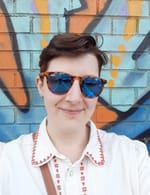Content warnings
Death. Blood. Gore. Grief.
I met a man once
He was like my grandfather, but not quite
Only his brother
Half. They had the same mother. Two fathers who fought for her love when she didn’t care for either.
When I met him—granduncle—he was already old.
Fingers twisted from arthritis. A wet bandage over his right hand seeping a wound the local healer had inflicted. Trying, failing, to fix a hand only decade shy of a century.
My man, grand-uncle, handed me blue naira notes with his good hand. I nodded politely, my father nudged me to smile, but not too much,
We were village sight-seeing in the old methodist church. Old only in age, the furnishings were pristine. The missionaries had gone and they left indigenes to run God’s house. The church now spoke Yoruba, the weekly bulletins scattered with diacritics. The melody of the choir husky enough to carry a staccato language to the divine.
My uncle nodded back at me, squeezed my hand and called me his child.
“He’s the last of the family line now,” my father said when he turned away.
“On that side, I mean,” he added quickly. Separating himself from the deadbeat portion of his lineage.
And I wondered if it were possible, that separation. If a family was like an animal to be drawn and quartered, which side gets the heart? Does the blood ever ache for what could have been? The paths it used to know.
My grandfather was dead twelve years before I was born. His brother was still here, the last of grandpa’s lungs fading away. Because if grand-uncle were part of a whole, he would be that—the breathing organ that didn’t ask questions. Just raised and lowered itself in a steady tide, keeping something else, something undefined alive.
There are ghost stories that show up in my dreams, and I never know what to do with them. These phantom hauntings, half-remembered when I wake up. Images faded away in morning light, only with their terror preserved.
They show up later in yet another dream, yet another bewildered awakening. Yet another unexplained terror at the sight of a teenager with bandaged forearm on the bus.
Yet another asking, if it were a warning or a visitation.
Messages spilling together in the subverbal; being chased by a strange man through streets I’ve never been to, but knew were in my father’s village. The untarred roads of his childhood. Talking heads that chattered me on my way to sleep. The man weeping in the corner over a brother or a son or a father. The food presented to me; strange fruit that dripped with delicate dew, that promised me something that I would never be able to come back from.
When my granduncle died, I thought I could be relieved.
But none of it stopped.
His burial was planned to pompous heights. Nine outdoor canopies rented for guests, each for a decade of life he lived.
“He was a cocoa farmer,” I heard someone say. “You could take out one million from his account and he wouldn’t notice.”
He was also a retired school principal with all the absent-minded humility it caused. He was also, I remembered, the last of a bloodline. Even if me living, breathing with my own lungs, were technically part of that line. But it was only in my breathing. The heart, the emotion of what family meant, the possibility, was gone with him.
In his last rites at the church, the same one I had met him in, he rose out of the coffin while the organ was chiming and a soprano lifted itself to heaven.
My granduncle seemed tired, either from the weight of breathing longer than he would have liked. Or maybe dying was an effortful endeavor, and he needed a moment to catch his breath.
Of course, only I could see him. We locked eyes and he nodded at me, that acknowledgment. My child.
That night of his funeral, I saw him again.
He put his hands to his chest, bent fingers suddenly scissor sharp, cutting through his own ribs. I watched in horror but he continued.
The blood dripped in the dreamspace, a single line on the floor drawn between us.
With his chest open, he handed me his lungs and the still-beating heart attached.
No. I shook my head.
“No.” My voice floated in the emptiness.
And I walked back, out of the emptiness. Moving past the nothing. Past the boy crying in the corner with torn school uniform and the father who never provided for him. Past the chattering voices I now heard clearly: and so? even if he was a useless father, your blood is still your blood. Past the line of accusing eyes.
Past my own unutterable question; what am I trying to escape?
Past my granduncle’s last-ditch attempt; don’t make the same mistake your father did.
When I got to the other side, everything was quiet.
But the two men were still waiting for me. One of them with the similar hooded eyes of my father, his hands showing the slightest bend that didn’t ripen to old age.
Together, him and my granduncle held those same lungs to me, the heart now pouring blood everywhere like an overdone metaphor. They held it out like a question, like an offering that did not want to be refused.
END
This story was nominated for the Pushcart Prize.
Busayo Akinmoju
Busayo Akinmoju is a writer and a doctor. Her work has been published in Smokelong Quarterly, Lucent Dreaming, The Republic, among others. A pushcart nominee, her work was also a category winner in the Welkin prize for flash fiction and is featured in the Wigleaf Top 50, 2023. She likes to read, and to relax on long walks.
- Website: https://busayomoji0.wixsite.com/a-busayo
- Bluesky: https://bsky.app/profile/busayo.bsky.social
- X(Twitter): @Tro_0per



Member discussion: